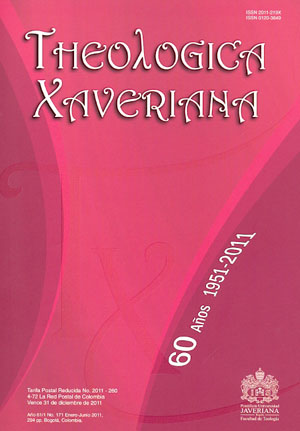Abstract
Thanks to the anthropological, hermeneutical, and political turns, Catholic theology has come to acknowledge the theological and pastoral importance of relating human situations and Christian message. In particular, pastoral or practical theology, which promotes a reflective consciousness about ecclesial action, has allowed the acknowledgement of the critical, performative, and dialectical correlation between social analysis, theological interpretation of reality, and the transformation of ecclesial practices. This article presents the basic principles, objectives, and limits of the correlation method in the context of practical theology. To do so, the author uses as fundamental reference Marc Donzé’s theological reflection.
This journal is registered under a Creative Commons Attribution 4.0 International Public License. Thus, this work may be reproduced, distributed, and publicly shared in digital format, as long as the names of the authors and Pontificia Universidad Javeriana are acknowledged. Others are allowed to quote, adapt, transform, auto-archive, republish, and create based on this material, for any purpose (even commercial ones), provided the authorship is duly acknowledged, a link to the original work is provided, and it is specified if changes have been made. Pontificia Universidad Javeriana does not hold the rights of published works and the authors are solely responsible for the contents of their works; they keep the moral, intellectual, privacy, and publicity rights.
Approving the intervention of the work (review, copy-editing, translation, layout) and the following outreach, are granted through an use license and not through an assignment of rights. This means the journal and Pontificia Universidad Javeriana cannot be held responsible for any ethical malpractice by the authors. As a consequence of the protection granted by the use license, the journal is not required to publish recantations or modify information already published, unless the errata stems from the editorial management process. Publishing contents in this journal does not generate royalties for contributors.


